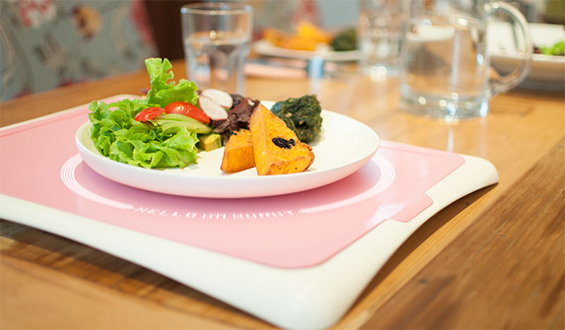
Finally, a way to get kids to eat their veggies. It’s called Yumit, and it was born when Rodrigo Gorosterrazu, a creative technologist at the Argentinian firm Wunderman, was complaining about trying to get his daughter to eat what was on her plate. “Talking about Popeye and the benefits of spinach, or about eating carrots to improve your vision, no longer convinces this generation,” he says. The Wunderman team knew there must be a technology-based way to make mealtime interesting to kids, but that would not distract them from eating.
Enter the Yumit. There is nothing like dangling a carrot in order to get your child to eat a carrot, writes Liz Stinson of Wired. The interactive dinner tray converts what the child eats into virtual energy that can be used for upgrades and extras on mobile games.
A strip of multi-colored LEDs encircle the Yumit plate, changing from white to green as kids eat more of their food. The purpose is to give the kids some visual feedback and to motivate continued eating. The plate rests on a scale that measures the weight of each bite, so as the peas and carrots are eaten, the data is transmitted by Bluetooth to an app.
“For example,” says Gorosterrazu. “[parents]will know how long it takes them to chew their food by measuring the time between bites, as well as how long their children take to eat and the total amount of food they consume.”
As good as all this data is, the coolest thing about Yumit is that it translates the actual, physical energy into a virtual points system in real time so kids can learn about why food is important. Now, the Wunderman team is developing games that will put the virtual energy to use and plan to eventually integrate the energy into popular games.
In the beginning of its development, the team considered a punishment if kids did not eat their vegetables, such as locking kids out of the game, but kids responded in a better way to positive reinforcement.
According to a report from Boston University School of Medicine, too much interactive screen time is impairing children’s social and emotional development, says Froma Harrop, writing for the Sun Journal.
“If these devices become the predominant method to calm and distract young children,” the researchers write, “will they be able to develop their own internal mechanisms of self-regulation?”
Will this gadget add new temptations to the growing pile of technological addictions? Picture children gulping down spoonfuls of food so they can get to the video game faster. The Boston University research showed that young children learn best through direct human-to-human interaction, which could take the form of a civilized dining routine which includes healthful food that happens to be delicious, and children watching adults enjoying and eating their peas.
On the Yumit site, the makers suggest that Yumit “helps them focus on their food by turning meal times into a fun game.” Yumit, says the site, holds the attention of kids at mealtime and makes mealtimes an “interactive experience.”




